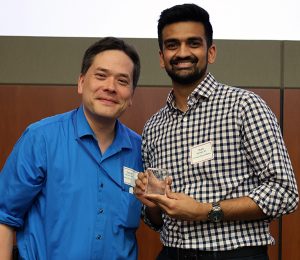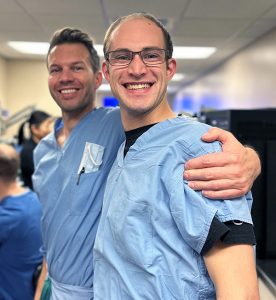The Ophthalmology Residency Training Program at the University of Wisconsin School of Medicine and Public Health has undergone an exciting evolution — one that’s redefining how future ophthalmologists are trained, mentored, and empowered. With updates to both research and didactic education, the program is setting a new standard for excellence in academic medicine.
Resident Research Curriculum Update
In 2019, the Department of Ophthalmology and Visual Sciences launched the Resident Research Committee (RRC) to elevate the resident research experience from informal case reviews to rigorous, high-impact scholarship. Comprised of program leadership, basic and clinical science faculty members, and administrative support, the multidisciplinary committee meets monthly to guide residents through a structured research journey.
Thanks to the RRC’s efforts, ophthalmology residents now benefit from:
- A clear research rubric with defined milestones
- Dedicated mentorship from faculty
- Protected time to focus on scholarly work
Under the new research rotation structure, every resident now participates in at least one research project during their residency training, gaining hands-on experience in study design, data analysis, and academic writing.
“This curriculum teaches residents how to take a project from concept to completion,” said Anna Momont, MD, vice chair of resident education and residency program director. “Through presentations at local, national, and international conferences and publication in peer-reviewed journals, our residents are making a real impact on patient care.”
The Resident Research Curriculum was spearheaded by Drs. Andrew Thliveris, Robert Nickells, Michael Nork, Tetyana Schneider and Christina Thomas-Virnig. Five years after inception, it has yielded impressive results. For example, our residents have won “Best Resident Research Presentation” award at the Wisconsin Ophthalmology Research Day two years in a row.

Didactics Update: Revitalizing Resident Lecture Series
This academic year also marked the debut of the Chief Resident Symposium, a new lecture series designed to broaden the scope of traditional didactics and prepare residents for the real-world complexities of medical practice. Organized by Chief Resident Breanna Aldred (Class of 2025) the symposium goes beyond clinical training to explore topics including:
- Social determinants of health
- Physician wellness and ergonomics
- Financial literacy and contract negotiation
The inaugural lineup of guest speakers brought diverse expertise and real-world experience to the table. In addition to Dr. Momont, residents engaged with Calli Becker, MSW, APSW, Steven Hill PT, and Michael Johnson, JD, all of whom shared valuable perspectives on patient advocacy, workplace wellness, and navigating the business side of medicine.
“This initiative reflects a growing recognition that today’s ophthalmologists must be more than skilled clinicians and surgeons,” said Jonathan Chang, MD, associate residency program director. “They must also be informed advocates, savvy negotiators, and resilient professionals. By creating space for these conversations, the Chief Resident Symposium is helping shape the next generation of leaders in eye care.”

The work to improve the resident lecture series will continue as Chief Resident Rushi Mankad (Class of 2026) takes the reins. Drs. Momont and Chang have also created a Basic Science Lecture Series Redesign Committee to develop a more interactive learning experience for the residents beyond traditional lectures.
Dr. Alana Bryant, PGY2 and member of the Redesign Committee stated “As a new PGY2, I’ve quickly come to understand the importance of finding and adapting a sustainable means to study in residency. One of the strongest reasons I ranked this program #1 is the educational structure; the commitment to providing residents high quality education is apparent. I am incredibly excited to be a part of this committee and hope that my contributions will lead to lasting, impactful change that will benefit both current and future residents. My goal as a member is to build on the existing design to keep learning in residency engaging and fun without feeling like a daunting burden.”
